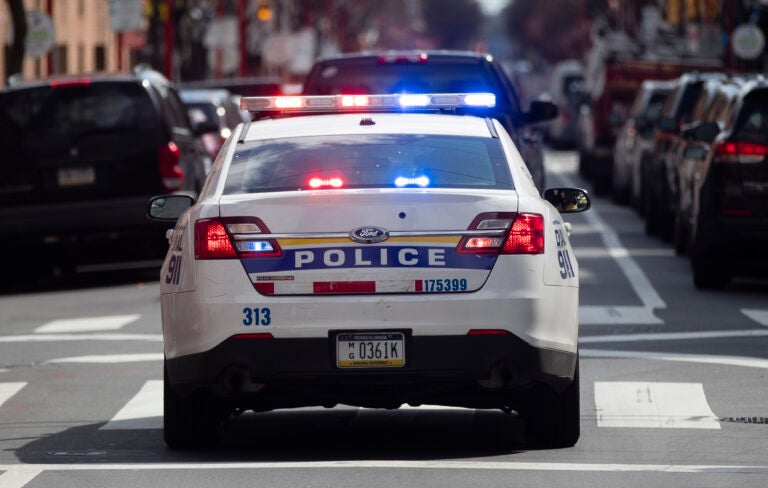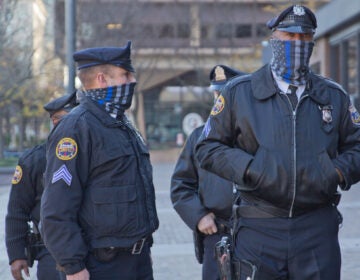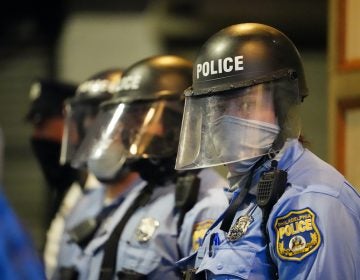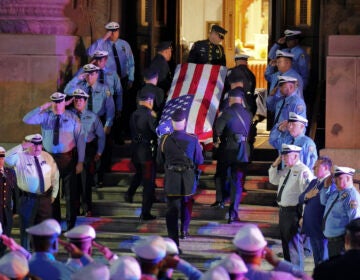Police experimenting with less ‘stop and frisk’ policing in Northwest Philadelphia
A federal judge has ordered the PPD to test what happens when officers change how they handle quality of life offenses like littering, panhandling, and carrying open liquor co

A Philadelphia Police Department cruiser is pictured in this file photo. (AP Photo/Matt Rourke)
Updated at 6:35 p.m.
A federal judge has ordered the Philadelphia Police Department to test what happens when officers reduce “stop and frisk” policing for so-called quality of life offenses like littering, panhandling, and carrying open liquor containers.
The pilot project, part of an ongoing court case, comes nearly three months after a group of civil rights attorneys asked U.S. District Judge John Padova to order the city to halt these stops because they are rife with racial disparities.
“There’s nothing that we, on our side, anticipate could be a major problem, ” said David Rudovsky, whose law firm filed the motion in March along with the ACLU of Pennsylvania.
The pilot will start in the 14th Police District, which was selected for its racial and socioeconomic diversity. The district covers parts of the city that have majority white and higher-income residents, such as Chestnut Hill, as well as majority Black and low-income residents, such as Germantown.
Under the order, officers who observe or respond to reports of quality-of-life offenses will be instructed to ask people to stop what they’re doing and move along. During these so-called “mere encounters,” officers would not ask for identification or run a background check.
If the individual refuses to comply, only then may the officer conduct an official stop. These must be in line with departmental guidelines, which require the officer to have “reasonable suspicion” or probable cause that someone has broken the law.
The pilot will begin Aug. 1 and run for three months. At the conclusion of the project, Rudovsky’s team and the police department will independently review and audit the results, then discuss the respective reports to determine whether the pilot should be expanded citywide, modified, or scrapped entirely.
“We think this will be a model and we’ll move on from there,” Rudovsky told WHYY News.
Judge Padova’s order also instructs the police department to develop a plan and protocols to hold accountable and discipline officers who demonstrate a pattern of making racially-biased stops, as well as reward officers who do not have that track record.
The goal is to codify the plan and those protocols into a new accountability directive or departmental regulation. It would add to the PPD’s current rules designed to address racial bias.
The Kenney administration hopes the pilot “leads to better outcomes for the community,” said spokesperson Deana Gamble. “If not, we are committed to talking through changes to the program or other options”.
In an April filing, however, the city stood with the police department in opposition to any effort to curb officers’ ability to conduct quality-of-life stops, calling the potential policy shift “unprecedented” and “unjustified” in the face of surging violence.
A spokesperson for the city’s FOP police union declined comment.
In April, Mayor Jim Kenney’s administration and the police department retracted a memo sent to community groups that urged residents to hastily sign documents in support of “quality of life” policing practices. Officials pledged that any affidavits residents had already signed would not be submitted to Judge Padova as he worked on the pilot agreement.
‘Accountability officers’ and real-time evaluations
The pilot project is part of a federal consent decree known as the “Bailey agreement.” Brokered in response to a civil rights lawsuit a decade ago, its goal is to eliminate unconstitutional pedestrian stop-and-frisks in Philadelphia, as well as the racial disparities associated with the practice overall.
Since the start of the consent decree, the total number of illegal stops has significantly declined, but racial disparities have persisted — so that’s now a primary focus.
More than 90% of quality of life stops in the city, which make up nearly half of all pedestrian stops, are of people of color, most often Black people, said Rudovsky. Roughly 44% of Philadelphia’s population is Black, according to the U.S. Census Bureau.
Last summer, after many years of debate, the city officially acknowledged its use of stop-and-frisk is not only a driver of racial disparities, but that the practice “demonstrates as well systemic racial bias,” according to court documents.
The acknowledgment, considered a major victory for the plaintiffs, led to Judge Padova ordering the city to develop an action plan to address the issue.
The proposal the city came up with would:
- assign specially-trained “accountability officers” to five yet-to-be-determined police districts
- evaluate the work of those accountability officers on a real-time basis
- provide annual trainings for the entire police force that review the consent decree and legal standards for stop-and-frisk
- have police commanders review randomly selected stops and accompanying body-worn camera footage
After both sides agreed on the plan, Judge Padova reviewed it and issued this week’s order to begin the pilot program.
Under the order, the PPD must assign the first set of accountability officers no later than July 1. These officers will then begin reviewing real-time data to look for racial disparities or bias in pedestrian stops.
Data they’ll look at include the racial breakdown of stop-and-frisks by an officer in comparison to other officers in their district or division; the racial breakdown of stops with or without reasonable suspicion; and the racial breakdown of quality of life stops.

Get daily updates from WHYY News!
WHYY is your source for fact-based, in-depth journalism and information. As a nonprofit organization, we rely on financial support from readers like you. Please give today.







